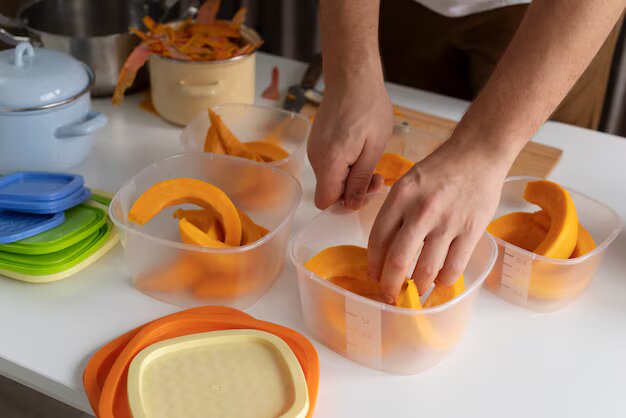
How to Reduce Food Waste with Proper Storage Solutions
Food waste is a pressing issue globally, with millions of tons discarded every year. According to the Food and Agriculture Organization (FAO), approximately one-third of all food produced worldwide goes to waste. Not only does this contribute to environmental problems, but it also represents a significant financial loss for households. One of the most effective ways to tackle this problem is by implementing proper storage solutions. By extending the shelf life of food and maintaining its quality, you can significantly reduce waste and save money.
In this blog, we will explore the best ways to reduce food waste through proper storage techniques. From understanding the science behind food spoilage to utilizing innovative tools and organizing your pantry, you’ll discover actionable tips to make your kitchen more sustainable.
The Importance of Proper Food Storage
Proper food storage helps to:
- Preserve Nutritional Value: Fresh produce and other perishable items lose nutrients over time. Storing them correctly helps maintain their quality.
- Extend Shelf Life: Proper storage prevents premature spoilage, ensuring that food stays edible for longer.
- Save Money: Less waste means fewer trips to the grocery store and lower grocery bills.
- Protect the Environment: Reducing food waste decreases the burden on landfills and minimizes greenhouse gas emissions from decomposing organic matter.
Common Reasons for Food Waste
To effectively reduce food waste, it’s crucial to understand its root causes. Here are some common reasons:
- Improper Storage: Many foods spoil quickly when stored incorrectly, leading to unnecessary waste.
- Overbuying: Purchasing more than needed often results in items expiring before they are used.
- Lack of Awareness: Many people don’t know how to store specific foods to maximize their longevity.
- Cluttered Pantries: When storage spaces are disorganized, items are forgotten and expire.
Top Food Storage Solutions to Reduce Waste
1. Understand the Ideal Storage Conditions for Different Foods
Not all foods require the same storage conditions. Understanding these can help keep items fresh longer:
- Fruits and Vegetables: Store in the crisper drawer of your refrigerator. Keep fruits and vegetables separate, as some fruits (like apples and bananas) emit ethylene gas, which accelerates ripening.
- Bread: Keep at room temperature in a breadbox. For longer storage, freeze slices and toast them as needed.
- Dairy Products: Store in the coldest part of your refrigerator, typically the back, to ensure maximum freshness.
- Dry Goods: Store in airtight containers to prevent moisture and pests.
2. Invest in High-Quality Storage Containers
Reusable storage containers are a game-changer for reducing food waste. Look for options that are:
- Airtight: Keeps out moisture and air, preventing spoilage.
- Transparent: Allows you to easily see what’s inside, reducing the chances of forgetting items.
- Stackable: Saves space in your refrigerator or pantry, making organization easier.
3. Use the Freezer Wisely
Freezing food is one of the best ways to extend its shelf life. Here’s how to make the most of your freezer:
- Label and Date Items: Clearly mark the contents and date of freezing to track how long they’ve been stored.
- Portion Food: Divide items into smaller portions to avoid defrosting more than you need.
- Use Freezer-Safe Bags or Containers: Prevents freezer burn and keeps food fresh longer.
- Freeze Leftovers: Instead of throwing away leftovers, freeze them for a quick meal later.
4. Organize Your Refrigerator and Pantry
A well-organized kitchen makes it easier to track what you have and use items before they spoil:
- First In, First Out (FIFO): Place newer items behind older ones to ensure the oldest items are used first.
- Group Similar Items: Keep similar foods together to find what you need quickly.
- Use Clear Containers: Helps you see what’s inside without opening them.
- Regularly Clean and Declutter: Remove expired or unused items to make space for fresh groceries.
5. Understand Expiration Dates
Many people throw away food prematurely due to confusion over expiration dates. Here’s what they actually mean:
- Sell-By Date: Indicates how long a store should display the product for sale. It’s not a safety date.
- Best-By Date: Refers to when the product is at its peak quality. It doesn’t mean the food is unsafe after this date.
- Use-By Date: The last date recommended for the product’s best quality. Only applicable to perishable items.
When in doubt, use your senses to check for spoilage before discarding food.
6. Embrace Zero-Waste Practices
Adopting zero-waste strategies can further reduce food waste:
- Composting: Turn food scraps into nutrient-rich compost for your garden.
- Creative Cooking: Use leftovers and scraps in soups, smoothies, or sauces.
- Batch Cooking: Prepare meals in advance to minimize waste from unused ingredients.
7. Innovative Storage Tools
Technology has introduced several tools that help reduce food waste:
- Vacuum Sealers: Remove air from bags or containers, keeping food fresh longer.
- Produce Savers: Special containers or liners that absorb ethylene gas to slow ripening.
- Smart Refrigerators: Equipped with sensors to monitor food freshness and send alerts when items are about to expire.
- Reusable Silicone Bags: Great for storing leftovers, produce, and snacks without using disposable plastic bags.
8. Educate Your Household
Reducing food waste is a team effort. Educate everyone in your home about proper storage techniques. Assign roles, such as checking expiration dates or organizing the pantry, to ensure everyone is involved.
9. Plan Your Meals
Meal planning helps prevent overbuying and ensures you use ingredients before they expire. Create a shopping list based on your weekly menu, and stick to it to avoid impulse purchases.
10. Buy Only What You Need
Avoid bulk buying unless you’re sure you can use the items before they spoil. Shop more frequently for fresh produce to ensure everything gets used.
Benefits of Reducing Food Waste
By implementing proper storage solutions, you’ll enjoy numerous benefits:
- Lower Grocery Bills: Spending less on food saves you money.
- Healthier Eating Habits: Fresher food retains more nutrients, supporting a balanced diet.
- Environmental Impact: Reducing food waste helps combat climate change and conserves natural resources.
- Time Savings: Meal planning and organized storage reduce the time spent deciding what to cook.
Final Thoughts
Reducing food waste through proper storage solutions is a simple yet impactful way to save money, protect the environment, and promote sustainability. By understanding how to store food correctly, investing in the right tools, and staying organized, you can significantly decrease waste in your household.
Start small by implementing one or two tips from this guide, and gradually expand your efforts. Every step counts in creating a more sustainable future for ourselves and the planet.

